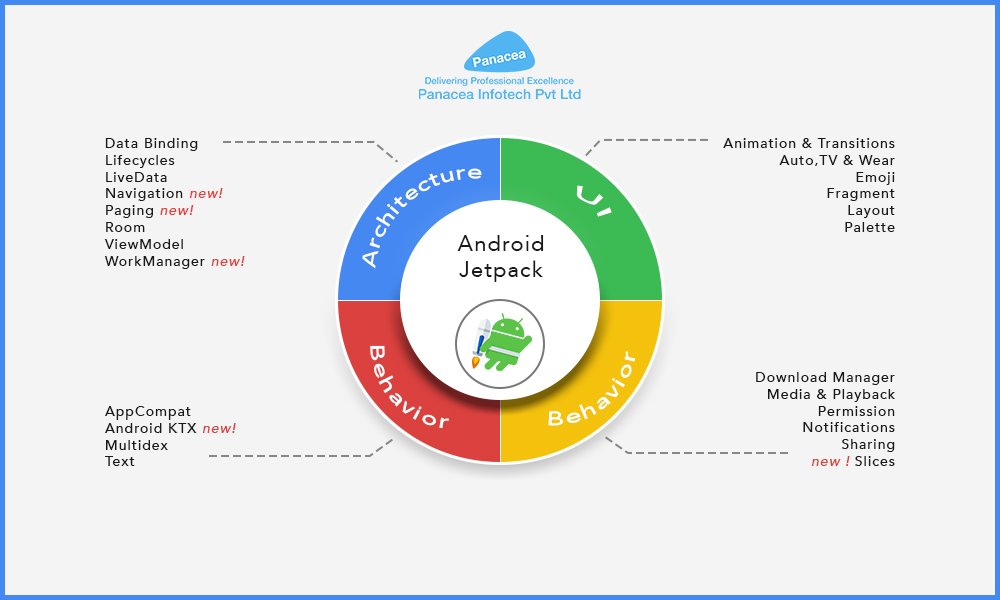- Panacea
- Updates
- 25th May 2018
The Release of Android Jetpack by Google Would Now Spur on App Development
As one of the best mobile application development companies in USA, you should always be well aware of the recent tech affairs making news nowadays.

Google has a new tool designed to help developers produce Android apps faster than ever. Called Android Jetpack, it builds on the Support Library and has a strong focus on backward compatibility. Android Jetpack is a set of Android components, tools, and guidance inspired by the backward affinity of the Support Library and the ease of use of the Android Architecture Components. Jetpack components can broadly be categorized into four categories: Architecture, UI, Foundation, and Behavior.
Essentially the successor to Support Library, Android Jetpack should develop a decent following — Support Library is already used by 99 percent of apps found in Google Play. The unbundled nature of Jetpack defines that developers will be able to make use of new functionality within their app quite promptly — there’s no more any need to crowbar in new code.
Android Jetpack is built around modern design practices like separation of concerns and testability as well as productivity features like Kotlin integration. This makes it far easier for you to build robust, high-quality apps with less code. While the components of Android Jetpack are built to work together, e.g. lifecycle awareness and live data, you don’t have to use all of them — you can integrate the parts of Android Jetpack that solve your problems while keeping the parts of your app that are already working great.
However, the key components associated with Android Jetpack are as follows-
WorkManager- The WorkMananager component is a powerful new library that provides a one-stop solution for constraint-based background jobs that need guaranteed execution, replacing the need to use things like jobs or SyncAdapters. WorkManager provides a simplified, modern API, the ability to work on devices with or without Google Play Services, the ability to create graphs of work, and the ability to query the state of your work.
Paging- Data presented in an app can be large and costly to load, so it’s important to avoid downloading, creating, or presenting too much at once. The Paging component version 1.0.0 makes it easy to load and present large data sets with fast, infinite scrolling in your RecyclerView. It can load paged data from local storage, the network, or both, and lets you define how your content gets loaded. It works out of the box with Room, LiveData, and RxJava.
Navigation- While activities are the system provided entry points into your app’s UI, their inflexibility when it comes to sharing data between each other and transitions has made them a less than ideal architecture for constructing your in-app navigation. So into GoogleIO18 introducing the Navigation component as a framework for structuring your in-app UI, with a focus on making a single-Activity app the preferred architecture. With out-of-the box support for Fragments, you get all of the Architecture Components benefits such as Lifecycle and ViewModel while allowing Navigation to handle the complexity of FragmentTransactions for you. Further, the Navigation component allows you to declare transitions, automatically builds the correct Up and Back behavior, includes full support for deep links, and provides helpers for connecting Navigation into the appropriate UI widgets, like the navigation drawer and bottom navigation. The Navigation Editor in Android Studio 3.2 also allows you to see and manage your navigation properties visually.
Kotlin extensions- This spectra of Android Jetpack would take advantage of Kotlin language features which, in turn, will make you more productive.
Slice- A “slice” is a way to surface your app’s UI inside the Google Assistant as a result of a search.
To conclude, Google has propelled Android Jetpack components with the goal of perking up the speed of Android app development. It is offering a wide range of benefits such as Support Library, Architecture Components as well as other new components. It is also providing support to Android Studio and Kotlin language. Google has also asked the developers to send their feedback and share their experience of using the Android Jetpack by looking up their official site.
Panacea Infotech is a leading mobile application development company in USA providing affordable Android as well as iOS app development services which cater to the unique requirements of our clients. We, the noteworthy iPhone app development company USA, would help you transform your slow business into a profitable venture. Our team of experienced developers in USA keep themselves up-to-date with the essential skills and can effectively use the latest features in every mobile app. This makes it easier for us to develop the ideal app for you. We are here to help you take your idea right from inception to a full-out app that can be downloaded on smartphones and tablet devices anywhere in the world. Being a renowned company in USA, our IOS application developers set their goals according to your requirement. We provide you with a finished product that helps your target audience to get the right message. We are a troop of solution providers for all your requirements on application development for a variety of iOS devices – from iPhones to iPad, and iPod Touch. So, for any query related to our service, you can contact us right away.

